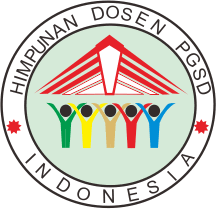Resepsi siswa sekolah dasar terhadap syair lagu Indonesia Raya 3 stanza
Abstract
Keywords
Full Text:
PDFReferences
Yuni, Q. F. (2017). Kreativitas Dalam Pembelajaran Seni Musik Di Sekolah Dasar: Suatu Tinjauan Konseptual. ELEMENTARY: Islamic Teacher Journal, 4(1). https://doi.org/10.21043/elementary.v4i1.1980 [2] Putra, F. P., & Permana, A. (2020). Perkembangan Lagu Indonesia Raya (Tahun 1928-2009). Historia Madania, 4(2). [3] Nihwan, L. (2017). W.R. Supratman: Guru Bangsa Indonesia. Badan Pengembangan dan Pembinaan Bahasa. [4] Kementerian Pendidikan dan Kebudayaan (2018). Peraturan Menteri Pendidikan Dan Kebudayaan Republik Indonesia Nomor 22 Tahun 2018 Tentang Pedoman Upacara Bendera Di Sekolah. 22(8), 1–13. [5] Adjoteye, E. A., Saragih, M. Y., & Ridwan, M. (2021). Methodological Approaches to Reception Analysis Research in Ghanaian Media Studies. Budapest International Research and Critics Institute (BIRCI-Journal): Humanities and Social Sciences, 4(1), 1545–1551. https://doi.org/10.33258/birci.v4i1.1786 [6] Mulyatiningsih, E. (2011). Riset Terapan Bidang Pendidikan dan Teknik. UNY Press. [7] Wardana, & Djamaluddin, A. (2020). Belajar Dan Pembelajaran (II). CV. Kaafah Learning Center. [8] Maghfhirah, S., & Maemonah. (2019). Pemikiran Behaviorisme dalam Pendidikan (Studi Pendidikan Anak usia Dini). Jurnal Pendidikan Anak, VI(2), 89–110. [9] Sanyata, Sigit. (2012). Teori dan Aplikasi Pendekatan Behavioristik dalam Konseling. Jurnal Paradigma, 7(14), 119–135. [10] Rufaedah, E. A. (2017). Teori Belajar Behavioristik Menurut Perspektif Islam. Risâlah, Jurnal Pendidikan Dan Studi Islam, 4(1), 14–30. DOI: https://doi.org/10.5281/zenodo.3550518 [11] Suryawan, I. G., Dwi, K., & Putra, S. (2020). Menumbuhkembangkan Apresiasi Seni Rupa Anak Sekolah Dasar Terhadap Karya Seni Lukis Kaca Nagasepaha. Jurnal Pendidikan Dasar, 1(2), 125–134. [12] Endraswara, S. (2008). Metodologi Penelitian Sastra: Epistemologi, Model, Teori,dan Aplikasi. Medpress. [13] Yang, H., & Qi, S. (2017). Translators’ Subjectivity in Literary Translation: From the Perspective of Reader-Reception Theory. 117(ICoSS), 116–119. https://doi.org/10.2991/icoss-17.2017.21 [14] Ratih, K., Srijono, D., Laksono, G. Y., Dewi, A. K., Jusup, B., Fitriyani, F., Hasanah, A. U., Farida, K., Pramesti, M. E., Setyaningsih, N. P., Darojati, S. M., & Mirwanti, W. (2020). Penguatan Nilai dan Karakter Nasionalisme melalui Lagu Wajib Nasional di MI Muhammadiyah Tanjungsari, Boyolali. Buletin KKN Pendidikan, 2(2), 75–78. https://doi.org/10.23917/bkkndik.v2i2.10793 [15] Sijabat, O. P., Sihombing, L. N., Sibagariang, S. A., & Sijabat, D. (2021). Perkembangan Peserta Didik Tingkat Dasar & Menengah (I). Perkumpulan Rumah Cemerlang Indonesia. [16] Bujuri, D. A. (2018). Analisis Perkembangan Kognitif Anak Usia Dasar dan Implikasinya dalam Kegiatan Belajar Mengajar. LITERASI (Jurnal Ilmu Pendidikan), 9(1), 37. https://doi.org/10.21927/literasi.2018.9(1).37-50 [17] Anwar, C. (2017). Teori-teori Pendidikan Klasik Hingga Kontemporer. Yogyakarta: IRCiSoD.
Refbacks
- There are currently no refbacks.



